|
|
|
Sort Order |
|
|
|
Items / Page
|
|
|
|
|
|
|
| Srl | Item |
| 1 |
ID:
159687


|
|
|
|
|
| Summary/Abstract |
The free trade agreement (FTA) between Australia and the European Union holds the promise of strengthened political collaboration and increasing economic integration. Both Australia and the European Union note increasing bilateral trade and investment. Oftentimes, data does not take current trends in global-value-chain participation for intermediary goods and services movements into account. Behind this sit the cross-border strategies and activities of business entities, whether multinationals or large, small or medium-sized enterprises. This article provides an in-depth investigation of the premise stemming from an FTA for Australian business. What advantages can politics hope to support through a business perspective? What is the global-value-chain part of the story, and what are the business challenges ahead? How can economic policy help shape this FTA to foster a productive bilateral business environment in a geopolitical and geoeconomic context in which regionalisation has taken on new momentum? Specific focus is given to the analysis of the higher education sector and to agriculture. These are two of the leading sectors in this FTA debate. Generating business value means setting negotiation agendas to target tariff and non-tariff barriers to counterbalance ambiguity in the conditions that shape the global business environment.
|
|
|
|
|
|
|
|
|
|
|
|
|
|
|
|
| 2 |
ID:
114563
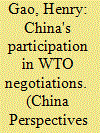

|
|
|
| 3 |
ID:
153315


|
|
|
|
|
| Summary/Abstract |
This article examines how contestable market theory (contestability) has come to reconfigure the economic and regulatory concept of competition in order to enhance the compatibility of Australia’s economy with international trade and investment agreements. Australia has recently negotiated and signed a raft of bilateral, plurilateral and regional agreements, including the Trans-Pacific Partnership Agreement and the Australia–China Free Trade Agreement. In order to ensure that Australia meets its obligations and commitments to these agreements, two key advisory bodies—the Harper Panel on Competition Policy Review and the Financial System Inquiry—made recommendations, the majority of which were accepted by the government, to ready Australia’s competition governance and economic policy for greater global integration. Such impact is dependent on, among other things, how domestic competition policy meshes with the free market ideology underpinning such international agreements, which favours the breakdown of barriers to markets. Less well known is the role of contestability in radicalising ideology as it countenances monopolisation and privatisation in the guise of market access by justifying the substitution of actual competition with the mere threat of competition. The article concludes that the monopoly power of transnational corporations will be enhanced through the acquiescence of governments to the new governance regime of the Trans-Pacific Partnership Agreement, which, supported by domestic policy, is set to redraw competition policy in the light of contestability theory.
|
|
|
|
|
|
|
|
|
|
|
|
|
|
|
|
| 4 |
ID:
170102


|
|
|
|
|
| Summary/Abstract |
New economic geography (NEG) models predict that costly transport and the spatial distribution of demand affect the profits firms can earn in different locations, leading to higher wages for workers employed in cities with better geographic access to markets. In light of the ongoing economic integration and market reforms that occurred in China after 1995, we use three waves of Chinese Household Income Project (CHIP) data to measure the extent to which the influence of market access on wages changed and affected wage dispersion across Chinese cities over the next 12 years. Employing the gravity-based method of Redding and Venables (2004) to calculate the market access available to firms located in each city, we test whether the elasticity of the wage with respect to local market access increased over time. We find that in all three years market access of the worker's location has a positive and significant influence on the wage. Consistent with extensive labor market reforms of the late 1990s, the estimated wage elasticity doubles between 1995 and 2002 and is stable thereafter. Our estimates indicate that wages of all workers become more responsive to market forces in a manner consistent with NEG predictions, both skilled and unskilled and those working for state as well as private enterprises. We also provide evidence that these results are not driven by omission of other forms of agglomeration or by selection bias. Estimated spatial differences in nominal wages are large: a worker moving from an inland location to the coast in 2007 would have doubled his or her nominal wage. Counterfactual analysis indicates that spatial differences in market access contribute to wage inequality, but less so over time.
|
|
|
|
|
|
|
|
|
|
|
|
|
|
|
|
| 5 |
ID:
113957
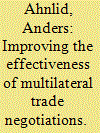

|
|
|
|
|
| Publication |
2012.
|
| Summary/Abstract |
The informal WTO ministerial meeting in July 2008 brought the long stalled Doha Round to the verge of a breakthrough. The reason for its final failure was substantive and not related to the negotiating procedures, which previously had contributed to meager results and failures in the round. The meeting was conducted using procedures that ensured a considerable amount of trustworthiness, transparency and legitimacy, which in turn contributed to effectiveness in the process. Thus, the meeting solved many, albeit not all, outstanding issues on the path towards agreement on so-called modalities for agriculture and industrial products, which in turn would have been necessary for a final successful conclusion of the Round. The 2008 July negotiations demonstrated that complex large-scale multilateral negotiations can be handled procedurally in an acceptable and successful way. The article advances a neglected interpretation of the July meeting, and provides lessons for both future WTO negotiations and multilateral negotiations in other policy areas.
|
|
|
|
|
|
|
|
|
|
|
|
|
|
|
|
| 6 |
ID:
143537
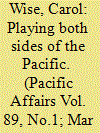

|
|
|
|
|
| Summary/Abstract |
One of the most prominent trends in Latin America in the 2000s has been the proliferation of bilateral free trade agreements (FTAs) across the Pacific basin. Beginning with the path-breaking Chile-Korea FTA in 2004 up to the Costa Rica-Singapore FTA in 2013, the past decade has seen the negotiation of twenty-two cross-Pacific accords. China, too, has jumped on to the cross-Pacific FTA bandwagon, including its negotiation of separate bilateral FTAs with Chile (2006), Peru (2009), and Costa Rica (2011). This paper analyzes the origins, content, and preliminary outcomes of these three China-Latin America FTAs. The findings are threefold: 1) in contrast with other cross-Pacific FTAs, which include at least one developed country, the three FTAs analyzed in this paper constitute “south-south” FTAs; yet, in contrast with other south-south FTAs, these three China-Latin America accords approximate WTO+ standards vis-à-vis the World Trade Organization (WTO) and its new trade agenda (services, investment, and intellectual property rights); 2) although the motives for negotiating these developing- developing country accords varied, on the part of China and the countries themselves, this did not disrupt the march toward WTO+ status; and 3) while all three of these FTAs elude standard theoretical explanations for the negotiation of bilateral FTAs, the three Latin American countries do share similar reform trajectories and institutional affinities, which sheds light on the decision and capacity of each to negotiate a bilateral FTA with China.
|
|
|
|
|
|
|
|
|
|
|
|
|
|
|
|
| 7 |
ID:
070890
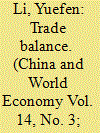

|
|
|
| 8 |
ID:
114558
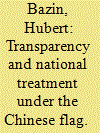

|
|
|
|
|
| Publication |
2012.
|
| Summary/Abstract |
Since 2001, China has, overall, respected the commitments it made when it joined the WTO. However, no "WTO spirit" has been observed that might have led it to go beyond the letter of these commitments, and very many non-tariff barriers are still in place. In view of the modernisation of its legal framework, is there room for improvements that would enable foreign companies to find their place more easily in a rapidly expanding market, or do structural obstacles stand in the way of the developments hoped for by its main partners?
|
|
|
|
|
|
|
|
|
|
|
|
|
|
|
|
| 9 |
ID:
124727


|
|
|
|
|
| Publication |
2013.
|
| Summary/Abstract |
Canada and the European Union (EU) began negotiating a comprehensive economic and trade agreement (CETA) in May 2009. The authors survey both the process and the content of CETA from the perspective of the province of Quebec. For the first time, Canadian provinces and territories have fully participated in international trade negotiations that will impact them directly and engender important economic benefits. CETA will ensure that Canadian provinces and territories obtain real market access for their goods and services to the EU's 500 million consumers. It will encourage and increase foreign investment as well as create further labour mobility between Canada and the EU. Quebec will benefit from a growing and deeper relationship with the EU through trade and cooperation, thereby fostering economic globalization and integration.
|
|
|
|
|
|
|
|
|
|
|
|
|
|
|
|
|
|
|
|
|